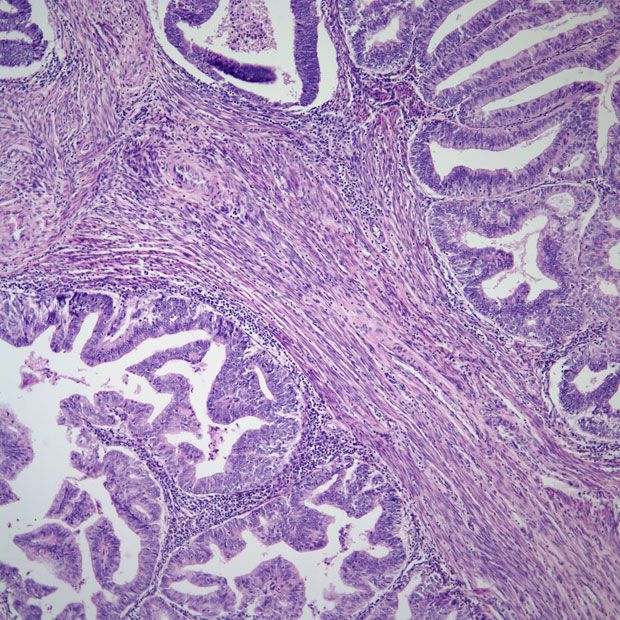Frontline Advanced Endometrial Cancer Therapy Confers High Economic Burden
Total costs for endometrial cancer therapy in the first line appear to be higher for those diagnosed with metastatic disease compared with those who do not have metastatic disease.
“Further research is needed to investigate new cost-effective treatments that could improve outcomes for patients with newly diagnosed advanced or recurrent [endometrial cancer],” the study authors wrote.

First-line treatment for patients with advanced or recurrent endometrial cancer in the United States was found to have significant health care resource utilization (HCRU) and economic burden, according to findings from a retrospective cohort study published in the Journal of Health Economics and Outcomes Research.
Among 7932 patients included in the study, all-cause visits to a non-pharmacy medical setting were reported in 99.9%, and visits related to endometrial cancer were highlighted in 82.8%. Investigators reported that 91.4% and 68.7% of patients had outpatient visits due to all-cause and endometrial cancer-related events, respectively.
The highest mean costs for inpatient hospitalizations were $8396 for all-cause visits and $9436 for visits related to endometrial cancer. Among patients diagnosed with metastatic disease, the mean inpatient hospital visit cost was $9210 per patient per month (PPPM).
“Despite treatment with commonly used chemotherapy regimens, patients with metastatic disease often have unfavorable outcomes,” the study authors wrote. “Further research is needed to investigate new cost-effective treatments that could improve outcomes for patients with newly diagnosed advanced or recurrent endometrial cancer.”
Investigators of this retrospective study collected data from the MarketScan® database, which is designed to aggregate de-identified medical, drug, and dental claims from over 245 million patients with private and public insurance. The study evaluated HCRU, treatment characteristics, and costs from the first claim in a patient record for frontline therapy until initiation of a subsequent line of anti-cancer treatment, database disenrollment, or expiration of data.
The primary objective of the study was to describe the HCRU and costs related to first-line treatment for patients with advanced or recurrent endometrial cancer and commercial insurance in the United States.
Investigators assessed baseline demographic and clinical characteristics for all patients included in the overall cohort. The study population was stratified by radiotherapy and metastatic disease at baseline.
Patients 18 years and older with continuous enrollment in a health plan with medical and pharmacy benefits for at least a year before and 30 or more days following treatment for de novo stage III/IV endometrial cancer were included in the study. Those with 1 or more claims for an anti-cancer treatment including hormonal therapies within 12 months prior to the treatment index date or at least 1 claim for pelvic radiotherapy around the same time were not included in the study.
Overall, 66.7% of patients included in the study had metastatic disease at baseline, and 28.2% underwent prior radiotherapy in the first-line setting. The mean patient age at index was 61.0 years, and 77.3% of the population received surgery for endometrial cancer. Of note, the mean non-cancer Charlson Comorbidity Index was 0.6 for those with no metastatic disease at baseline compared with 6.72 for those with metastatic disease.
The most common frontline treatment regimen was carboplatin plus paclitaxel (59.1%) followed by megestrol acetate (5.6%), cisplatin alone (3.5%), carboplatin plus docetaxel (2.3%), carboplatin plus cisplatin (2.3%), and carboplatin alone (2.3%). Investigators reported a median duration of 9.4 months (interquartile range, 7.3-11.4) for first-line therapy in the overall cohort. Additionally, the mean duration of follow-up was 22.6 months in the overall cohort.
According to the investigators, data on clinically confirmed staging and recurrent disease were not accessible in the MarketScan administrative data claims, making it impossible to differentiate patients based on disease stage. Another potential limitation included the fact that death could not be used as a criterion for the end of observation because it was not recorded in the database.
Reference
Kobayashi M, Garside J, Nguyen J. Healthcare resource utilization and costs among commercially insured patients with advanced or recurrent endometrial cancer initiating first-line therapy in the United States. JHEOR. 2023;10(2):104-110. doi:10.36469/001c.88419